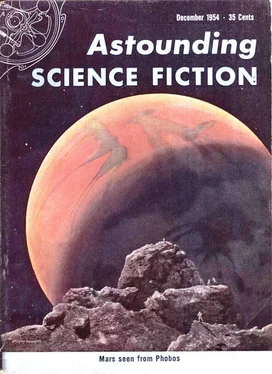Рэймонд Джоунс - The school
Здесь есть возможность читать онлайн «Рэймонд Джоунс - The school» весь текст электронной книги совершенно бесплатно (целиком полную версию без сокращений). В некоторых случаях можно слушать аудио, скачать через торрент в формате fb2 и присутствует краткое содержание. Город: New York, Год выпуска: 1954, Издательство: Street and Smith Publications, Inc., Жанр: Фантастика и фэнтези, Социально-психологическая фантастика, на английском языке. Описание произведения, (предисловие) а так же отзывы посетителей доступны на портале библиотеки ЛибКат.
- Название:The school
- Автор:
- Издательство:Street and Smith Publications, Inc.
- Жанр:
- Год:1954
- Город:New York
- ISBN:нет данных
- Рейтинг книги:3 / 5. Голосов: 1
-
Избранное:Добавить в избранное
- Отзывы:
-
Ваша оценка:
- 60
- 1
- 2
- 3
- 4
- 5
The school: краткое содержание, описание и аннотация
Предлагаем к чтению аннотацию, описание, краткое содержание или предисловие (зависит от того, что написал сам автор книги «The school»). Если вы не нашли необходимую информацию о книге — напишите в комментариях, мы постараемся отыскать её.
The school — читать онлайн бесплатно полную книгу (весь текст) целиком
Ниже представлен текст книги, разбитый по страницам. Система сохранения места последней прочитанной страницы, позволяет с удобством читать онлайн бесплатно книгу «The school», без необходимости каждый раз заново искать на чём Вы остановились. Поставьте закладку, и сможете в любой момент перейти на страницу, на которой закончили чтение.
Интервал:
Закладка:
He began laughing, a slow chuckle at first that quickly rose to almost uncontrollable spasms verging on hysteria, as he caught full sight of the ludicrous spectacle he made staggering under the weight of his self-created burden that had no existence for anyone else.
Slowly, the laughter died. And the panic came back. Not as strong as it was the first time, but it was there. He felt helpless and unanchored. It was all right to laugh at himself for behaving like a fool, but that didn’t change the fact that he had done the best he could under the circumstances. He was incompetent. He could never be an engineer like Soren Gunderson if he admitted he was all the fools who ever lived. Nothing could change the real picture of his inadequacy.
But why? he asked himself. The panic seemed to freeze a little and lose some of its violence as he probed the black screen where the shadows of himself were in hiding. He wasn’t a moron. Way back in school they’d tagged him, as Wolfe had said. They gave him an I.Q. test and wired on a label. But it was a good label. It put him way up in the top one per cent of the population as far as intellectual ability went.
In spite of this he’d been a complete bust. Or perhaps because of it? he wondered. He’d once felt sorry for those far below him in the merely average levels. But they were the successful ones now. Somebody had made an extensive study once, he remembered, about high I.Q. failures. He wondered what they found out.
Probably nothing. A man should be able to answer his own questions, but there was no answer in sight as far as he could see. He’d tried to do everything right in school, from the first day to the last. Top honors, all the way through. They’d patted him on the head approvingly, as if he were a pet pup. In the grades there’d been a time when he was shunned as the teacher’s favorite.
Homeostatic controls, Dr. Nagle said. What did that mean, anyway? What controls had he agreed to accept during his school days? The concept made no sense —
He gasped in sudden helplessness as if a flood poured down upon him while he sat chained, unable to move. Black waves washed forward, sweeping over him. His body strained upward, as if seeking the air, then he slumped before the flood, babbling and whimpering in terror.
He didn’t know how long he lay there. It seemed as if forever, and there was a dark whispering of leaves in his ears and the flashing of bright-edged pages before his eyes. The leaves of the calendar of all the days, and the pages of all the books —
But it was utterly insane. School had not been these dark days of terror. It had been warm and friendly. Warm and friendly — while they pinned on his mind each of ten thousand tiny homeostats to see that he never moved out of line. He was the teacher’s pet with the I.Q. of a genius.
And for daring to glimpse behind their professional smiles and watch the little machines they attached to his cortex they would shake him with this terror.
He couldn’t endure it. He cried out for them to take him back. He wouldn’t look again, he promised. He would believe forever that they loved him and he wouldn’t tell anyone about the little machines in his mind.
The black waves receded. He sat up, drenched with sweat. Drops of it fell from his chin to his shirt front. He opened his eyes dazedly and glanced up at the panels of the Mirror. I’m going crazy, he thought numbly. The machine is driving me crazy —
Nagle and Berkeley and Wolfe had found out why he was here. That was it. They knew who he was and why Dodge had sent him. He had been a fool to think they would let him in that easy. They had set the machine so that it would make a babbling idiot out of him, and when they got through with him no one would believe anything he said about the Institute. He glared up at the panels. If he could only reach up there and smash something to turn it off. But he couldn’t get up. All his strength was gone. Maybe in a minute more — if he could just sit here without thinking.
Dimly, he remembered Wolfe saying all he had to do was remove the headpiece and the machine would shut down. The thought struck him with panic again. He couldn’t do that. He had to keep it on his head. He had to wear it forever, he thought —
He couldn’t keep from thinking. He couldn’t keep from thinking that something had gone wrong. Something terribly wrong along the line somewhere. He should have come out of school competent and able — and he’d come out a dud. It didn’t matter whose fault it was. What mattered was why it happened. He’d done everything they told him to. Every single thing. He’d even let them dim the high ecstasy of new worlds.
That’s what mathematics had been for him. He knew something of the history of astronomy and computation when he came to high-school geometry and algebra. He expected it to be the opening of a door to a bright, new world.
But Mr. Carling didn’t see it that way. Mr. Carling was a tired, mousy little man who had taught too many courses in Plane Geometry and Algebra II. There was no mystery or magic in it for him. As soon as school was over he had to change to his good, brown suit and other shoes and go out selling ready-made suits of men’s clothes. Sometimes he even let the class wait while he was showing samples to one of the other teachers.
Even so, Eugene Montgomery doggedly solved all the unreal problems assigned by Mr. Carling out of the textbook fairyland that didn’t fit any world either of them knew anything about. He got a straight A all the way through, too. He accepted Mr. Carling’s word that geometry was very useful to a manufacturer in knowing how many dustpans he could press out of a certain amount of sheet metal, and it helped the oil companies in knowing how many ships they’d have to have to transport so much oil across the ocean. He gave up the vision of a world of abstract beauty and light he’d glimpsed before encountering Mr. Carling and the ready-made suit business.

Mr. Pond, the physics teacher who didn’t like confusion in the physics lab, so there had been no lab work during the course —
Mr. Raily, who was very solemn, and spoke every day of the obligations of world citizenship and the duties of the individual toward his group —
Miss Thompson, who couldn’t explain why it was necessary to diagram English sentences, but for whom he obediently did it —
Professor Adams, who constantly interrupted his lectures on Statics with remarks on the high obligation of the engineer towards his profession and the public to see that only standard practices are ever employed —
To each one he had adapted himself. They poured it out in lectures and texts. He gave it back in examinations and recitations. And they commended him for his high scholarship.
And none had ever asked: “Do you have an idea that is better than this, Eugene Montgomery?”
No one had ever asked if he had any ideas at all. It didn’t seem to matter. As long as he could function as a mental brick wall, bouncing back all they gave out, it was adequate.
But it had been pleasant — warm and friendly and pleasant. He remembered those years as the best of his life. There was no terror there. It was absurd to —
Now it was coming back. Slow, dark waves lapping at the edge of his mind. And he knew why it was there — yes, because he dared look upon himself as a student. The dark, lapping waves were the alternative to docile obedience and absorption of all he was taught. He would have brought them swirling up uncontrollably about his head in those high-school years if he’d dared allow himself to think Mr. Carling was an old fool, deaf, dumb and blind to the wonder of the beautiful thing he was murdering. There might have been a dozen in that class who could have been shown its light and beauty if their tender vision had been nourished carefully.
Читать дальшеИнтервал:
Закладка:
Похожие книги на «The school»
Представляем Вашему вниманию похожие книги на «The school» списком для выбора. Мы отобрали схожую по названию и смыслу литературу в надежде предоставить читателям больше вариантов отыскать новые, интересные, ещё непрочитанные произведения.
Обсуждение, отзывы о книге «The school» и просто собственные мнения читателей. Оставьте ваши комментарии, напишите, что Вы думаете о произведении, его смысле или главных героях. Укажите что конкретно понравилось, а что нет, и почему Вы так считаете.












